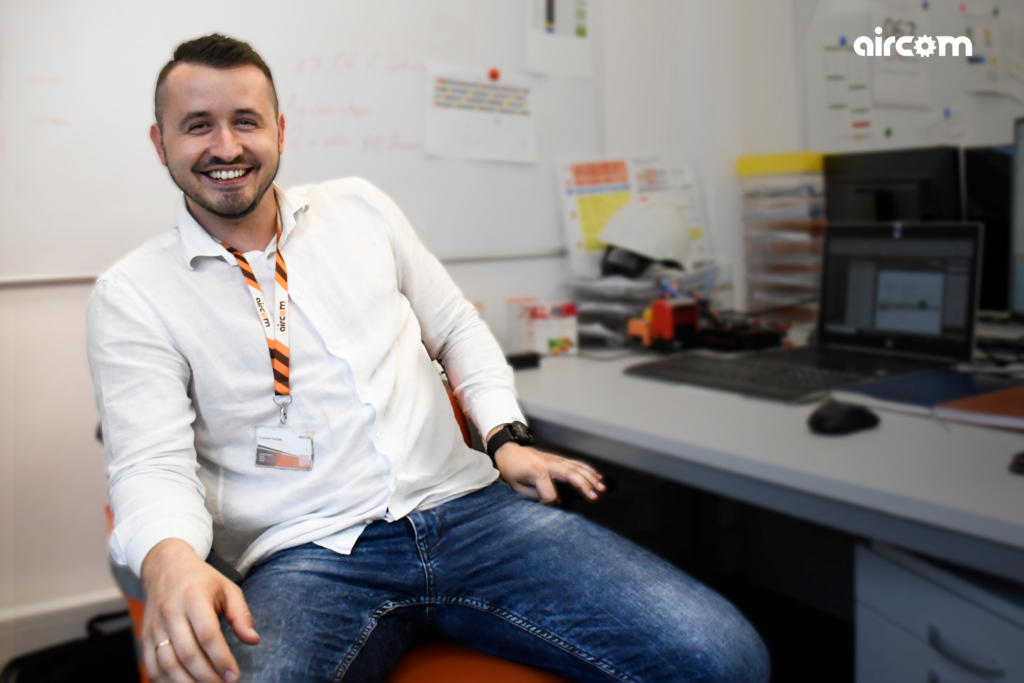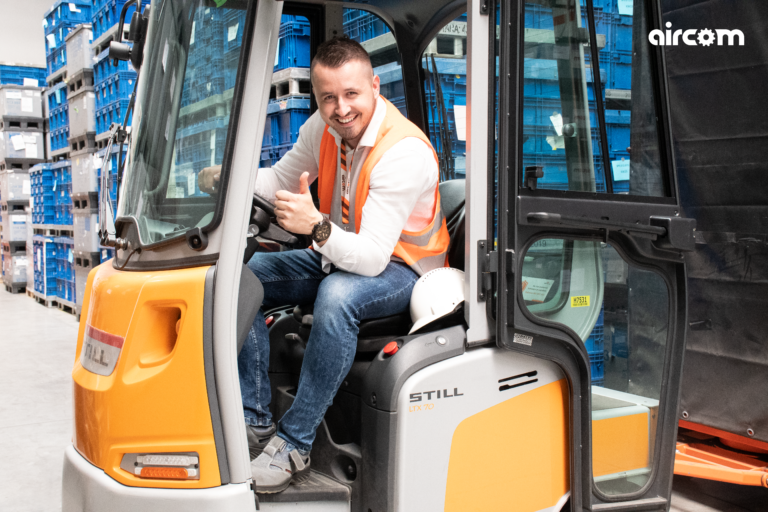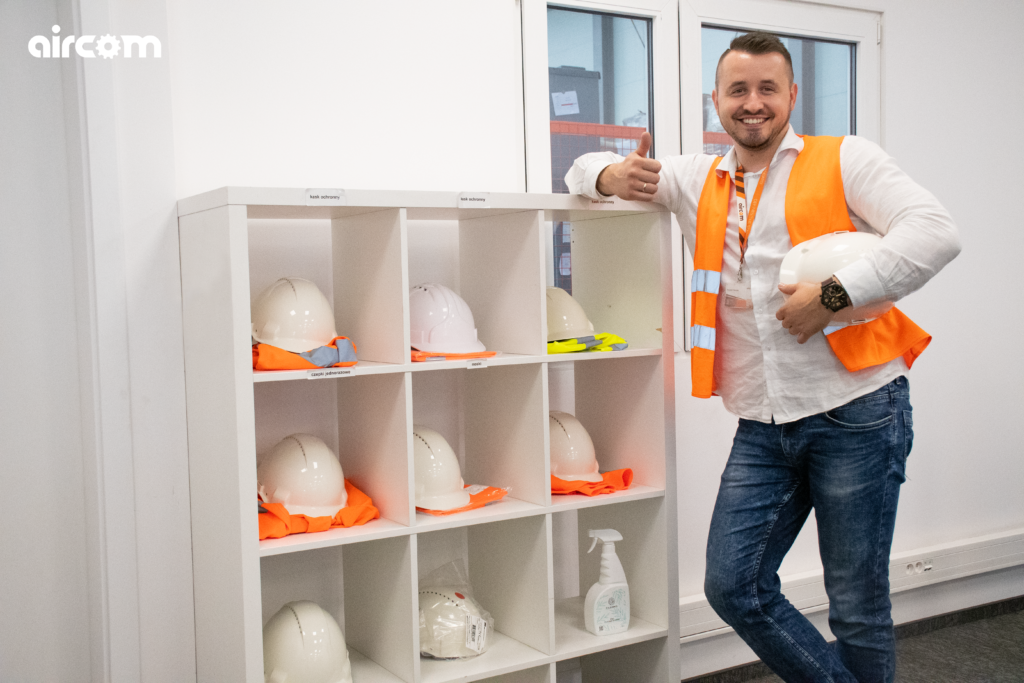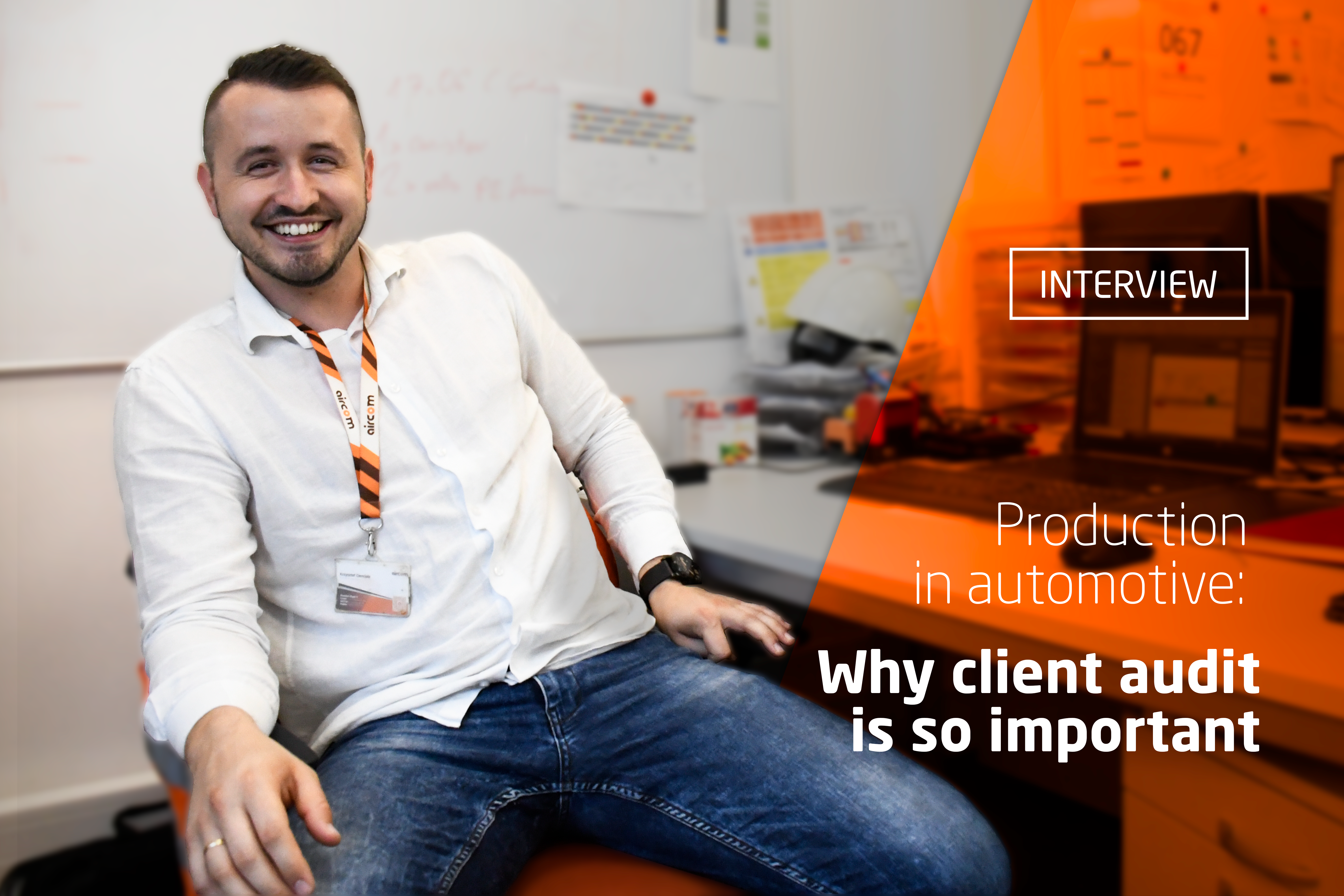Krzysztof Cienciała: ‘There is no time for stress in logistics’
How to define the standards in logistics? Everything starts from the client audit! OEM producers are obligated to constant improvement. Krzysztof Cienciała, our Logistics Manager, told us more about his last audit, and more such things like how to use the drones and special vehicles in automotive parts production.

- "The client verifies every detailed process in this aspect as well, from raw material input to finished product shipment."
- "At the moment, the element on which we must concentrate our powers is the implementation of a new ERP system. This is a big challenge for the entire company because you need to integrate all processes into one program and introduce a work culture on the solution provided by Infor. On the other hand, when it comes to smaller goals, the company grows at a tremendous pace, and therefore we are constantly looking for greater space efficiency"
- "We are aware that it depends on the cooperation of many people whether it will all go smoothly, so we do our best to get along well. (...) We know that this translates into less stress for warehouse workers"
How does Aircom reduce stress situations in logistics?
Mateusz Kulejewski: Before the interview, we have read the opinions on the Google business card about our company. Drivers praise the logistics department even for the fact that they can shower during loading! It looks like you care about all of your coworkers.
Krzysztof Cienciała: (Laughter) It really is! We are aware that it depends on the cooperation of many people whether it will all go smoothly, so we do our best to get along well. Focusing on the transport notification helped a lot. The fact that you will not meet a queue of trucks in Aircom results from well-planned time frames, not from low traffic in the company. We know that this translates into less stress for warehouse workers.
MK: And do you feel stress when the product is on its way to the customer, and you know that you have done everything you need to do right? You packed well, you loaded the product correctly…
KC: Stress is in logistics with every activity you have to do, but luckily you don’t have time to experience it. This is because the global trend towards lean production, to reduce stocks, to shorten delivery times…
MK: I thought that you’re the time setter in logistics
KC: (Laughter) Unfortunately, that’s not the case. Everything is dictated by the client, we usually only follow orders in advance (laughs). Therefore, from my perspective, the most important thing is to have a well-coordinated team that can simply support you in every activity, to carry it out properly, regardless of adversities…

Logistic requirements of atomotive customers
MK: So please tell me what were the requirements of the client from our last audit?
KC: In terms of logistics, the overall customer requirements are rather similar. For the duration of the audit on behalf of the client, a person responsible for its implementation is dedicated to us, most often someone from the supplier development or logistics department. Just in our company, my department is responsible for a wide range of activities, not only for DRP, i.e. shipping, or the organization of internal and external transports. The main requirements also apply to MRP, MRP II, MPS, i.e. broadly understood planning of supplies, material, human resources, and production planning.
MK: And probably when you have to plan the right number of people to produce a specific compressor, e.g. for Volvo, the biggest differences begin. A different number of people are in production for Mercedes …
KC: Yes, although a lot also depends on the engineering department, how they will plan the efficiency of the production line, the number of stations, or the components of the final product themselves. Of course, we adjust it later to the customer’s orders and to the warehouse stocks agreed with the management, because at Aircom we do not only produce “just in time”. Sometimes we also produce according to the MTS principle (Make to stock – ed.), So there are simply many factors that affect these differences, and there are actually a lot of people hiding different tasks that need to be performed.
Fulfillment of customer requirements at Aircom
MK: How do you compare these calculations with customer expectations?
KC: Before we start cooperation, we get access to the customer portal, from which we download extensive manuals. Each of them concerns something different, one is for EDI data exchange, the other for packing plans, another for notification… there are many of them. And here it is worth mentioning the differences between customers because for this customer who has just audited us, we have not yet prepared shipments in dedicated containers, for prototypes we have special solutions. Ultimately, however, we always have established packaging plans, and although the carrier is responsible for the goods during transport, the most important thing for us is to securely secure the cargo internally here, i.e. packing it in appropriate containers and checking if it is in good condition.
MK: And the containers themselves differ depending on the customer?
KC: Of course. Sometimes even the same customer has different packaging plans, so a different container has to be prepared. Therefore, it is some kind of difficult for us when planning production. Customers have different methods of packing, e.g. some require binding these pallets, others foiling. In addition, contracts are structured in such a way that we have to clean these containers, i.e. if they come to us with different labels, we are obliged to ensure that these containers leave us clean.
MK: We have such a big Karcher?
KC: No, no, no (laughs), we have special fluids that are suitable for this type of sticker. Our employees are equipped with masks and appropriate tools that can safely remove unnecessary labels for the container and themselves.
Conclusions after another audit at Aircom
MK: Did you remember anything special after the last audit?
KC: Its form itself was interesting. Practically for half a year we had meetings with the person responsible for logistics every two weeks and we had to adapt to her questionnaire by creating presentations that showed exactly how each of our processes looks in logistics areas.
The pandemic set many challenges for us, including the fact that we had to present many answers in the form of a remote audit, e.g. by recording videos. Admittedly, navigating through the production with cameras and playing certain roles was an interesting experience that we intend to use in the future as well.
MK: So, audits not only check how our company works, but also allow us to introduce news to our work?

KC: Of course. After the last one, we develop visual management, which was also suggested by the client. In the area of shipping, we have already implemented screens that display information about upcoming shipments. Thanks to them, employees can find out when they will have more work to do and this allows them to assess whether they can perform other duties. In addition, they have a live preview of what has already left us that day and what else needs to be sent. This allows us to double-check what is ordered by specialists. We also use these monitors to display information about delivery times to customers and car notifications, i.e. at what time intervals the cars are to arrive at the customer.
MK: It follows that the customer is interested not only in the delivered products but also in the conditions of employees.
KC: Of course, the client verifies every detailed process in this aspect as well, from raw material input to finished product shipment.
Logistics innovation in Aircom
MK: If you like to implement news suggested by customers, I am curious when you plan to implement drones in our supply chain?
KC: I was not prepared for such questions! (Laughter) Absolutely, we are in favor of implementing new solutions. In internal logistics, we have implemented Milk Run between our halls, perhaps it will soon be time to implement some RFID (remote digital identification system – ed.) and make inventory using drones. I strongly support following global trends.
MK: What made you decide to implement Milk Run?
KC: The production hall and the warehouse are separated by a certain distance, therefore we needed something that would be able to secure us with a larger transport volume. It is basically a trolley that pulls several platforms behind it, so we can store more material on it than with forklifts. Additionally, it has sliding curtains, thanks to which the material is not damaged or is not influenced by weather conditions.
MK: So if you’re handling well subsequent implementations, where do you see new challenges for your department soon?
KC: At the moment, the element on which we must concentrate our powers is the implementation of a new ERP system. This is a big challenge for the entire company because you need to integrate all processes into one program and introduce a work culture on the solution provided by Infor. On the other hand, when it comes to smaller goals, the company grows at a tremendous pace, and therefore we are constantly looking for greater space efficiency. We are currently implementing a supermarket solution with flow rollers that will allow us to be more efficient by storing material in production. We also provide shelves for chemical materials, with drip trays and other smaller tasks, also despite the work on the new ERP, which is time-consuming, I must say that a lot of things are happening in the background
Aircom opens a supermarket?
MK: What is this supermarket and how will it work?
KC: These are shelves with flow rollers, to which we deliver repackaged components in KLT containers, with our own barcodes, with full identification of parts. They are delivered to the right locations in a simple way: from the rear, a person moves the container on rollers, which slide forward. This solution is often used in factories. It also functioned in the past, but on a smaller scale and had to be dismantled. Currently, parts are delivered to the production hall on the KANBAN principle, i.e. generating demand by production, in the supermarket, we will simply make sure that their quantity does not fall below the specified minimum. Display screens and system solutions, which will inform about the need to deliver specific parts, will help us in this. It also helps us to stick to the FIFO (first in first out – ed.) principle and it actually allows for better transparency and a lot more efficiency. Above this supermarket, to use the storage space, we are going to build high bay pallet spaces.
MK: And thanks to this solution, it is also easier for the employee? The first association with a supermarket is that you walk in and you can choose what you need, milk, bread…
KC: (laughs) For sure, for an employee it means that he has easier access to a given component, so he does not have to look for a place where something is stored. Each location is specified with an assigned component, so the employee enters, takes, and exits just like in a store.
MK: Looking at the end from the perspective of our last audit, do you consider this audit as successful?
KC: Yes, and it’s not just my feeling, since new customers are constantly coming to Aircom! I’m working here for 6 years and I can really see that this place is still dynamically developing and still with great potential!





